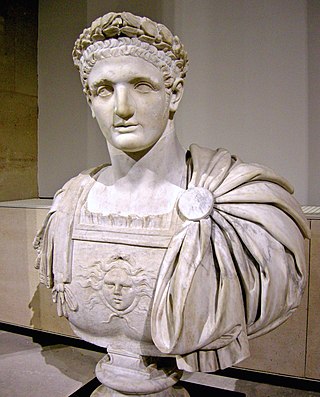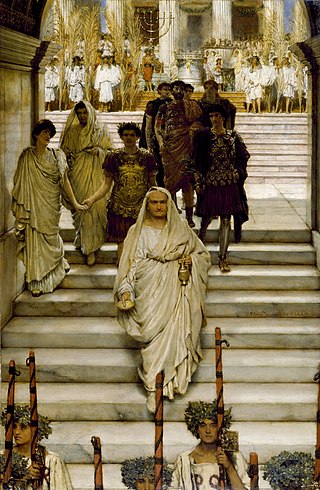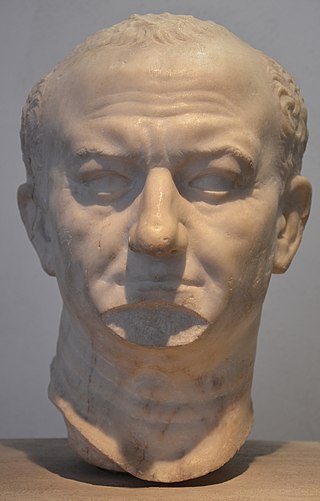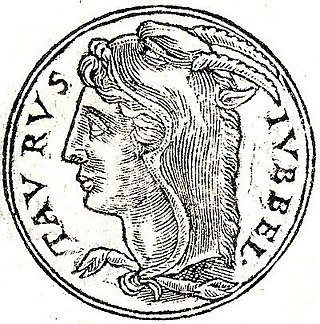Terentius Maximus, also known as the Pseudo-Nero, was a Roman who rebelled during the reign of Titus, but was suppressed. He resembled Nero in appearance and in action, as he was known to perform singing with the accompaniment of the lyre.
He gained his followers first in Asia, and then gained many more during his march to the Euphrates. He later fled to Parthia and tried to gain support there by claiming (supposedly in the person of Nero) that the people there owed him some requital for the return of Armenia. Artabanus III, a Parthian leader, out of anger towards Titus, both received him and made preparations to reinstate him to Rome. [1] He was executed when his true identity was revealed.
In 1936, Lion Feuchtwanger wrote The Pretender (Der falsche Nero), a fictional novel in which he compared Terentius Maximus with Adolf Hitler.

Domitian was Roman emperor from 81 to 96. The son of Vespasian and the younger brother of Titus, his two predecessors on the throne, he was the last member of the Flavian dynasty. Described as "a ruthless but efficient autocrat", his authoritarian style of ruling put him at sharp odds with the Senate, whose powers he drastically curtailed.

Titus Caesar Vespasianus was Roman emperor from 79 to 81. A member of the Flavian dynasty, Titus succeeded his father Vespasian upon his death, becoming the first Roman emperor ever to succeed his biological father.

The gens Petronia was a plebeian family at ancient Rome. This gens claimed an ancient lineage, as a Petronius Sabinus is mentioned in the time of Lucius Tarquinius Superbus, the last of the Roman kings, but few Petronii are mentioned in the time of the Republic. They are frequently encountered under the Empire, holding numerous consulships, and eventually obtaining the Empire itself during the brief reign of Petronius Maximus in AD 455.

The gens Claudia, sometimes written Clodia, was one of the most prominent patrician houses at ancient Rome. The gens traced its origin to the earliest days of the Roman Republic. The first of the Claudii to obtain the consulship was Appius Claudius Sabinus Regillensis, in 495 BC, and from that time its members frequently held the highest offices of the state, both under the Republic and in imperial times.

The Flavian dynasty, lasting from AD 69 to 96, was the second dynastic line of emperors to rule the Roman Empire following the Julio-Claudians, encompassing the reigns of Vespasian and his two sons, Titus and Domitian. The Flavians rose to power during the civil war of AD 69, known as the Year of the Four Emperors; after Galba and Otho died in quick succession, Vitellius became emperor in mid 69. His claim to the throne was quickly challenged by legions stationed in the eastern provinces, who declared their commander Vespasian emperor in his place. The Second Battle of Bedriacum tilted the balance decisively in favor of the Flavian forces, who entered Rome on 20 December, and the following day, the Roman Senate officially declared Vespasian emperor, thus commencing the Flavian dynasty. Although the dynasty proved to be short-lived, several significant historic, economic and military events took place during their reign.
Marcus Trebellius Maximus was a Roman senator active during the reign of Nero. He was suffect consul for the nundinium of May to June 55 AD as the colleague of Seneca the Younger, replacing Publius Cornelius Dolabella.

The gens Flavia was a plebeian family at ancient Rome. Its members are first mentioned during the last three centuries of the Republic. The first of the Flavii to achieve prominence was Marcus Flavius, tribune of the plebs in 327 and 323 BC; however, no Flavius attained the consulship until Gaius Flavius Fimbria in 104 BC. The gens became illustrious during the first century AD, when the family of the Flavii Sabini claimed the imperial dignity.

Artabanus III, incorrectly known in older scholarship as Artabanus IV, was a Parthian prince who competed against his brother Pacorus II for the Parthian crown from 79/80 to 81. Artabanus III's claim to the throne seems to have little support in the Parthian Empire, with the exception of Babylonia. Artabanus III's most notable action was to give refuge to a Pseudo-Nero named Terentius Maximus. Artabanus III initially agreed to lend military aid to Terentius Maximus to capture Rome, until he found about the real identity of the impostor. Coin mints of Artabanus III disappear after 81, which suggests that Pacorus II had defeated him.

De vita Caesarum, commonly known as The Twelve Caesars or The Lives of the Twelve Caesars, is a set of twelve biographies of Julius Caesar and the first 11 emperors of the Roman Empire written by Gaius Suetonius Tranquillus. The subjects consist of: Julius Caesar, Augustus, Tiberius, Caligula, Claudius, Nero, Galba, Otho, Vitellius, Vespasian, Titus, Domitian.
The gens Terentia was a plebeian family at ancient Rome. Dionysius mentions a Gaius Terentius Arsa, tribune of the plebs in 462 BC, but Livy calls him Terentilius, and from inscriptions this would seem to be a separate gens. No other Terentii appear in history until the time of the Second Punic War. Gaius Terentius Varro, one of the Roman commanders at the Battle of Cannae in 216 BC, was the first to hold the consulship. Members of this family are found as late as the third century AD.
Marcus Aurelius Cotta Maximus Messalinus was a Roman Senator who was a friend of the first two Roman emperors Augustus and Tiberius.
After the emperor Nero committed suicide near the villa of his freedman Phaon in June of 68 AD, various Nero impostors appeared between the autumn of 69 AD and the reign of the emperor Domitian. Most scholars set the number of Nero impostors to two or three, although St. Augustine wrote of the popularity of the belief that Nero would return in his day, known as the Nero Redivivus legend. In addition to the three documented Pseudo-Neros, Suetonius refers to imperial edicts forged in the dead Nero's name that encouraged his followers and promised his imminent return to avenge himself on his enemies.

The gens Vibia was a plebeian family at ancient Rome. Although individuals named Vibius appear in history during the time of the Second Punic War, no members of this gens are found at Rome until the final century of the Republic. The first of the Vibii to obtain the consulship was Gaius Vibius Pansa in 43 BC, and from then until imperial times the Vibii regularly filled the highest offices of the Roman state. The emperors Trebonianus Gallus and Volusianus each claimed descent from the family.

The gens Annia was a plebeian family at ancient Rome. Livy mentions a Lucius Annius, praetor of the Roman colony of Setia, in 340 BC, and other Annii are mentioned at Rome during this period. Members of this gens held various positions of authority from the time of the Second Punic War, and Titus Annius Luscus attained the consulship in 153 BC. In the second century AD, the Annii gained the Empire itself; Marcus Aurelius was descended from this family.

The gens Statilia was a plebeian family of Lucanian origin at ancient Rome. Members of this gens are first mentioned in the third century BC, when one of them led the Lucanian assault on the city of Thurii, and another commanded an allied cavalry troop during the Second Punic War; but at Rome the Statilii first come to attention in the time of Cicero, at which point they held equestrian rank. The first of the family to attain the consulship was Titus Statilius Taurus in 37 BC, and his descendants continued to fill the highest offices of the Roman state until the time of Marcus Aurelius.